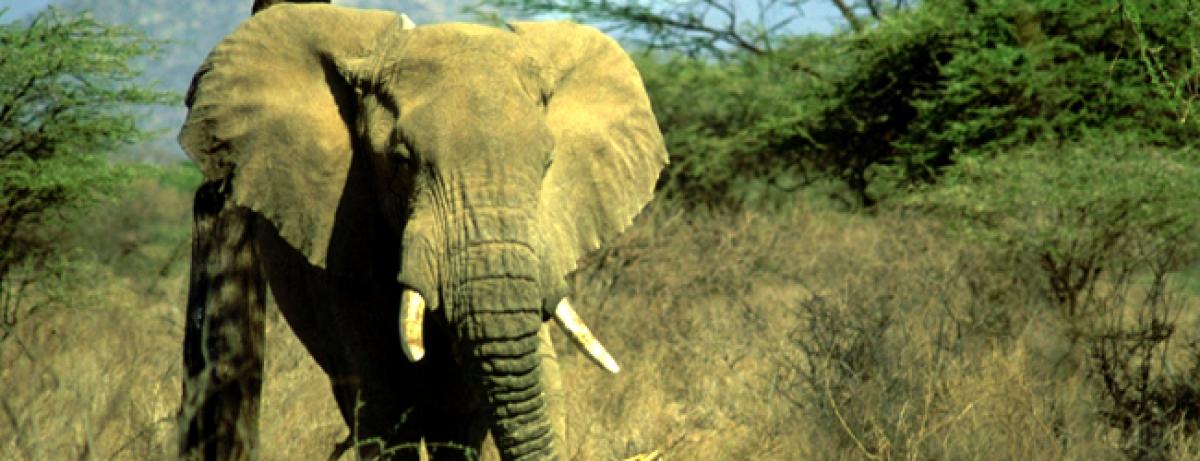Fight against illegal trade in wildlife a key challenge

New Delhi: With eco crimes like ivory smuggling, illegal logging and toxic waste touching record high of $258 billion globally, discovery of 40 dead tiger cubs in Thailand\'s famed tiger temple and with more tigers poached
New Delhi: With eco crimes like ivory smuggling, illegal logging and toxic waste touching record high of $258 billion globally, discovery of 40 dead tiger cubs in Thailand's famed tiger temple and with more tigers poached in the first five months of 2016 in India than in the entire 2015, makes the "Fight Against Illegal Trade in Wildlife" a perfect theme for this World Environment Day on Sunday, June 5.
"The amount of money lost due to environmental crimes is 10,000 times greater than the amount of money spent by international agencies on combating it -- just $20-30 million," says a report by United Nations Environment Programme (UNEP) and Interpol.
"Go Wild for Life", says this year's theme -- and the crime syndicate has already turned towards "the wild". Eco criminals are flush with money, and the laws are not strong enough to stop such crimes.
According to forest officials and wildlife conservators who stand as the first barrier between poachers and wildlife traffickers, the demand as well as rates for animal parts and specimens has increased over last year.
"One kilogram of rare pangolin scales would fetch a poacher around Rs 9,000-10,000 till last December; now it fetches them between Rs.18,000-20,000," Vikram Singh Parihar, a forest officer of Madhya Pradesh, told IANS.
India in April this year hosted the 'Third Asia Ministerial Conference on Tiger Conservation', which failed to set a stronger mandate before the world to protect the endangered species. India, at the same time, also failed to focus on other species, many of which are on the verge of extinction.
According to wildlife experts, pangolin, sea-horse, sea urchin, North Ring and Red Crown turtles, ghariyal, Gangetic sharks, Fishing Cat and Clouded Leopard are some of the species which might go extinct in a few years -- given the pace at which they are being targeted.
Wildlife experts and investigators, like Debbie Banks of Environmental Investigation Agency (EIA), have their hopes focused on the 17th meeting of the Conference of the Parties - CITES (the Convention on International Trade in Endangered Species of Wild Flora and Fauna) -- which is to be held in Johannesburg, South Africa in September -- to force governments around the world to stop the "licensed victimisation" of wildlife species, like lion and tigers.
"We hope that China would be asked to disclose its stockpiles of tiger bones, which no one has access to," Debbie Banks told IANS in a conversation.
Indian Environment Minister Prakash Javadekar has several times stressed on stiffening the penalties for eco-crimes.
As per a joint report by the United Nations Environment Programme (UNEP) and Interpol, with an estimated 'black revenue' of $258 billion, the illegal environment trade or "Environmental Crimes" has outstripped the illegal trade in small arms.
"International criminal gangs and militant groups profit from the plunder of Earth's resources," a UNEP statement released on World Environment Day said.
The UNEP-Interpol report adds that environmental crime has notched an annual growth of 5-7 per cent. This is 1.9 to 3.9 times higher than Global Economic Growth, says the International Monetary Fund.
Crimes like trafficking hazardous waste, poaching and logging cost the world economy between some $91-258 billion in 2015, which was 26 per cent higher than previous estimates, while it stood at $70-213 billion in 2014.
According to government records, which experts claim widely under-report, about 3,622 cases of wildlife crime were reported in India in the last three years. A group of elephant poachers was arrested last year from Kerala with 18 elephant carcasses and 538 kg of ivory. Most of the poachers, however, go free.
"The biggest issue is sustaining prosecution and investigation efforts when it comes to wildlife crimes. Poachers arrested with tiger bones and hides get away with bail for a mere Rs 400 to 500. That is the problem we need to deal with to stop all this," Kartick Satyanarayan, co-founder of wildlife conservation organisation Wildlife SOS, told IANS.
Meanwhile, the wildlife organisation Wildlife Conservation Trust (WCT) on Saturday discovered the rare 'Eurasian Otter' in Madhya Pradesh.
The fascinating discovery was made by camera trapping over a vast area of 5,800 sq. km. in extremely rugged terrain of the Satpura hills and the Kanha-Pench corridor in Madhya Pradesh done by the forest department in collaboration with WCT.
Hope appears to be returning, but the question of how to protect this newly discovered species in the backdrop of existing laws remains ambiguous.














